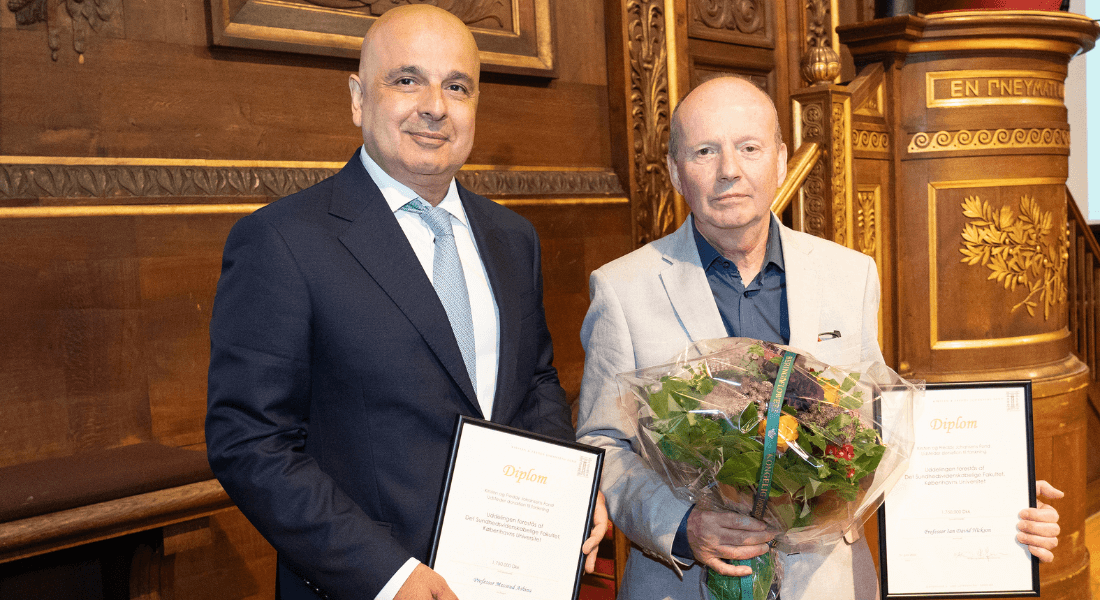“The beauty of research is that you’re trying to make a discovery that nobody else in the world has ever made before”
Two researchers from the Faculty of Health and Medical Sciences at the University of Copenhagen are honoured with the prestigious KFJ prize, which is awarded every year by the Kirsten and Freddy Johansen Foundation for outstanding achievements in medical science, among other things.

This year, the preclinical award goes to Ian Hickson, who is a professor in the Department of Cellular and Molecular Medicine, and the clinical award goes to Messoud Ashina, who is a professor in the Department of Clinical Medicine. The prizes include DKK 1.75 million each for research.
We spoke to Ian Hickson about his motivation to understand the mechanisms behind cancer, and about what got him to where he is today.
What is your research about, and why is it important?
We study how DNA in human cells is maintained, how it remains stable, and how it is packaged into structures called chromosomes. We do this to find out what goes wrong with chromosomes when human diseases develop. There are many types of diseases that are caused directly by problems of keeping your chromosomes stable. Cancer is the most obvious one, which is really a disease of your DNA, a disease of your chromosomes. But there are many others as well, including neurodegeneration diseases where regions of your brain start to degenerate and shrink. Understanding how disease arises is important not only for understanding more about biology and medicine but of course the aim is to generate therapeutic interventions to improve the treatment of these diseases.
When did you know that you wanted to be a researcher?
Not early in life. I always wanted to do science. Science fascinated me at school. I knew I wanted to be in science. But I did not really have any knowledge of research at the time. Then at the university I volunteered to work in a laboratory to learn more about it, partly because I had a friend there. And then I thought, this is what I want to do. So, I went on to do a PhD at the university.
I have always found discovery exciting. The beauty of research is that you are trying to make a discovery that nobody else in the world has ever made before. What really excites me is the idea that we are close to a new finding that will be something that adds to the total knowledge we have in biology.
Who has been the biggest inspiration in your career?
Quite a few people have. I think the person who stands out the most as an inspiration to really develop my career in a serious way was the person after whom an institute in Oxford was named. It's called the Weatherall Institute of Molecular Medicine. David Weatherall was the first director of the institute, and he was ahead of his time in many ways. He was one of the people who said to the medical school, we will never be able to treat all these human diseases unless we combine molecular science with medicine.
What has been the biggest challenge in your career?
I have been lucky in my career, I would say. I have not had huge challenges that have been problematic for me. We live in a world where you spend half your time trying to raise enough money to do what you want to do. So, of course, raising money is a permanent challenge. I have been looked after very well by funding agencies over the years, and I have been extremely lucky to also be in the right place at the right time.
What are you most proud of in your career?
I am very proud of some of the work that we are doing now. One thing that I am doing, which is very unusual for people in the medical school, is to work together with theoretical and experimental physicists. I have been lucky to have center funding, and the benefit of that is the time that you have to develop something that might take five years. So, I have spent much of the last few years developing a whole new system for studying chromosomes using methods and principles that were only really ever used by physicists, and biologists have never heard of them.
What is your most important piece of advice for those who want to do research?
Go for it. It is a very exciting thing to do. If you want to do science, the university is still the place to do fundamental science. And do not worry about how many years of contract you have. If it is a thing that you are excited by, go for it. Worry about being successful. Worry about being fascinated by science. But do not be worried about challenges that there might be in the future. If you are successful, your career will generally look after itself.
The KFJ prize
Every year, the Kirsten and Freddy Johansen Foundation's prize is awarded to two researchers who have made outstanding achievements within, among other things, medical science. Both prices include DKK 2 million, of which 250,000 is a personal prize.
Contact Information
Professor Ian Hickson
+45 35 32 67 38
